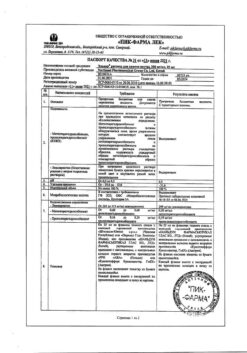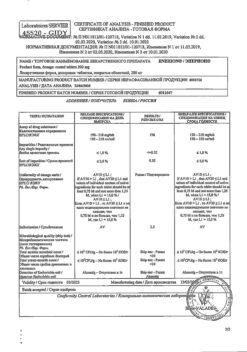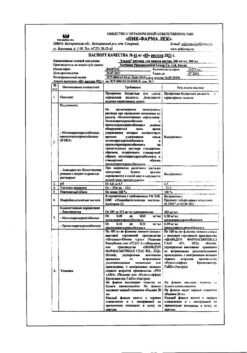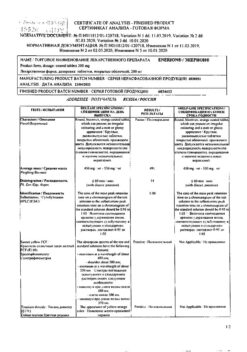No products in the cart.
Ultra-D Vitamin D3 25 mcg (1000 IU), 120 pcs.
€29.24 €24.37
Description
Classic effects are associated with regulation of calcium-phosphorus metabolism: vitamin D increases absorption of calcium and phosphorus in the intestine, increases reabsorption by kidneys, increases mineralization and elasticity of bone tissue, normalizes neuromuscular transmission, prevents myopathy against mineral metabolism disorders (manifested muscle weakness, difficulties in walking, balance and a tendency to fall). Adequate levels of vitamin D in children prevents the development of rickets, and in adults, osteomalacia (decreased bone strength).
Nonclassical (extra-osseous effects):
Reproductive functions: Vitamin D can positively affect the production of sex hormones (estradiol and progesterone). Vitamin D deficiency is noted in 67-85% of women with polycystic ovarian syndrome. The restoration of the recommended concentrations of vitamin D in the blood of these women contributes to the correction of metabolic disorders, improvement of endometrial quality, and restoration of the menstrual cycle. In IVF programs, pregnancies occur 1.5 times more often in women with sufficient vitamin D levels.
The probability of having a child after IVF/ERF is significantly higher in women without vitamin D deficiency. Low vitamin D levels are associated with an increased risk of endometriosis. During menopause, the need for vitamin D increases due to an increased risk of osteoporosis.
Pregnancy: During this period, vitamin D is especially important for both the mother and the unborn child. Studies show that low levels of vitamin D are associated with an increased risk of gestational diabetes, preterm birth, preeclampsia, and cesarean section. Maternal hypovitaminosis leads to rickets in children, including congenital rickets, increased risk of intrauterine infection, and impaired immune regulation. Children born to mothers with normal levels of vitamin D are less likely to suffer from respiratory viral infections and bronchiolitis.
Lactation: The period of breastfeeding is a time of high vitamin D requirement for the mother.
Male fertility: Vitamin D deficiency in men can lead to the development of secondary hypogonadism (lack of sex hormones), decreased production of testosterone, disorders of spermogram parameters (reduction of the total number of sperm cells, the number of sperm cells with normal morphology and a decrease in their motility and linear speed), and also – to increase the risk of type II diabetes, which is a fact of male infertility development.
Nervous system: Participating in the production of neurotransmitters (substances transferring impulses between neurons), vitamin D has a positive effect on cognitive function, psycho-emotional sphere and performance, improves mood and helps to combat stress.
Immune system: Immunomodulatory effect is associated with the activation of all parts of the immune system. Vitamin D stimulates the activity of cells of the immune system in the bone marrow, has anti-inflammatory properties.
Metabolism: Normal levels of vitamin D help normalize fat metabolism, positively affect the course of metabolic syndrome, and reduce total cholesterol, triglycerides, and low-density lipids. Normalization of energy production in cells leads to increased vitality.
Endocrine system: Vitamin D deficiency plays a role in the formation of insulin resistance and glucose tolerance. According to studies, against a background of vitamin D deficiency decreases insulin production by pancreatic cells, disrupts the parathyroid gland and adrenal glands.
Indications
Indications
As a biologically active food supplement – an additional source of vitamin D.
Pharmacological effect
Pharmacological effect
Classic effects are associated with the regulation of calcium-phosphorus metabolism: vitamin D increases the absorption of calcium and phosphorus in the intestine, increases their reabsorption by the kidneys, increases mineralization and elasticity of bone tissue, normalizes neuromuscular transmission, prevents myopathies due to disturbances of mineral metabolism (manifested by muscle weakness, difficulties in walking, maintaining balance and a tendency to fall). Adequate levels of vitamin D in children prevent the development of rickets, and in adults – osteomalacia (decreased bone strength).
Non-classical (extraosseous effects):
Reproductive functions: Vitamin D can have a positive effect on the production of sex hormones (estradiol and progesterone). Vitamin D deficiency is observed in 67-85% of women with polycystic ovary syndrome. At the same time, restoration of the recommended concentrations of vitamin D in the blood of these women helps to correct metabolic disorders, improve the quality of the endometrium, and restore the menstrual cycle. In IVF programs, pregnancy occurs 1.5 times more often in women with sufficient levels of vitamin D.
The likelihood of having a child after ART/IVF is significantly higher in women without vitamin D deficiency. Low vitamin D levels are associated with an increased risk of developing endometriosis. During menopause, the need for vitamin D increases due to an increased risk of osteoporosis.
Pregnancy: During this period, vitamin D is especially important for both the mother and the unborn child. Research shows that low vitamin D levels are associated with an increased risk of gestational diabetes, preterm birth, preeclampsia and cesarean section. Hypovitaminosis D in the mother leads to rickets in children, including congenital, increased risk of intrauterine infection and impaired immune regulation. Children born to mothers with normal vitamin D levels are less likely to suffer from viral respiratory infections and bronchiolitis.
Lactation: The period of breastfeeding is a time of increased need for vitamin D for the mother.
Male fertility: Vitamin D deficiency in men can lead to the development of secondary hypogonadism (lack of sex hormones), decreased testosterone production, abnormalities in spermogram parameters (a decrease in the total number of sperm, the number of sperm with normal morphology and a decrease in their motility and linear speed), as well as an increased risk of developing type II diabetes mellitus, which is a fact of the development of male infertility.
Nervous system: By participating in the production of neurotransmitters (substances that transmit impulses between neurons), vitamin D has a positive effect on cognitive functions, psycho-emotional sphere and performance, improves mood and helps fight stress.
Immune system: The immunomodulatory effect is associated with the activation of all parts of the immune system. Vitamin D stimulates the activity of immune system cells in the bone marrow and has anti-inflammatory properties.
Metabolism: Normal levels of vitamin D help normalize fat metabolism, have a positive effect on the course of metabolic syndrome, and reduce the level of total cholesterol, triglycerides and low-density lipids. Normalization of energy production in cells leads to increased vitality.
Endocrine system: Vitamin D deficiency plays a role in the formation of insulin resistance and glucose tolerance. According to research, against the background of vitamin D deficiency, the production of insulin by pancreatic cells is reduced, and the functioning of the parathyroid gland and adrenal glands is disrupted.
Special instructions
Special instructions
The determination of the daily dose and duration of vitamin D intake can be made individually by the doctor, depending on the results of laboratory tests and medical history, and may differ from that recommended in this leaflet. Do not exceed the dose recommended by your doctor.
Thanks to solubilization (interaction with saliva components), absorption of the vitamin from chewable tablets Ultra-D Vitamin D3 25 mcg (1000 IU) begins in the oral cavity. The mucous membrane of the oral cavity is abundantly supplied with blood, so vitamin D quickly enters the bloodstream. Once swallowed, vitamin D absorption continues in the small intestine through the formation of micelles (multilayered colloidal particles).15,16 The dual absorption mechanism of cholecalciferol from the chewable tablet ensures a high rate of absorption and the achievement of adequate serum vitamin D levels.
Contains sweetener. If used excessively, it may have a laxative effect.
Nutritional value of 1 tablet: sugar alcohols – 0.4 g, energy value – 0.9 kcal (4.9 kJ).
Composition
Composition
1 tablet contains:
Cholecalciferol (vitamin D3) – 25 mcg (1000 IU).
Auxiliary ingredients:
sweetener xylitol (E967),
sweetener sorbitol (E420),
thickener hydroxypropylcellulose (E463),
anti-caking agent for magnesium fatty acid salts,
antioxidant alpha-tocopherol (E307),
palm oil
carrier modified starch (E1450),
sucrose,
antioxidant sodium ascorbate (E301),
anti-caking agent amorphous silicon dioxide (E551),
raspberry flavor,
peach flavor.
Side Effects
Side Effects
The occurrence of side effects of vitamin D directly depends on the dose consumed; side effects occur if recommended doses are significantly exceeded.
Overdose
Overdose
Symptoms of hypervitaminosis: increased calcium levels in the blood, nausea, vomiting, headache, muscle pain, palpitations, decreased appetite, thirst, weakness.
Short product description
Short product description
Dietary supplement Not a medicine.
Before use, it is recommended to consult a doctor (specialist).
Manufacturer
Manufacturer
Pharmia OY, Finland
Additional information
| Manufacturer | Pharmia OY, Finland |
|---|---|
| Medication form | chewable tablets |
| Brand | Pharmia OY |
Other forms…
Related products
Buy Ultra-D Vitamin D3 25 mcg (1000 IU), 120 pcs. with delivery to USA, UK, Europe and over 120 other countries.














